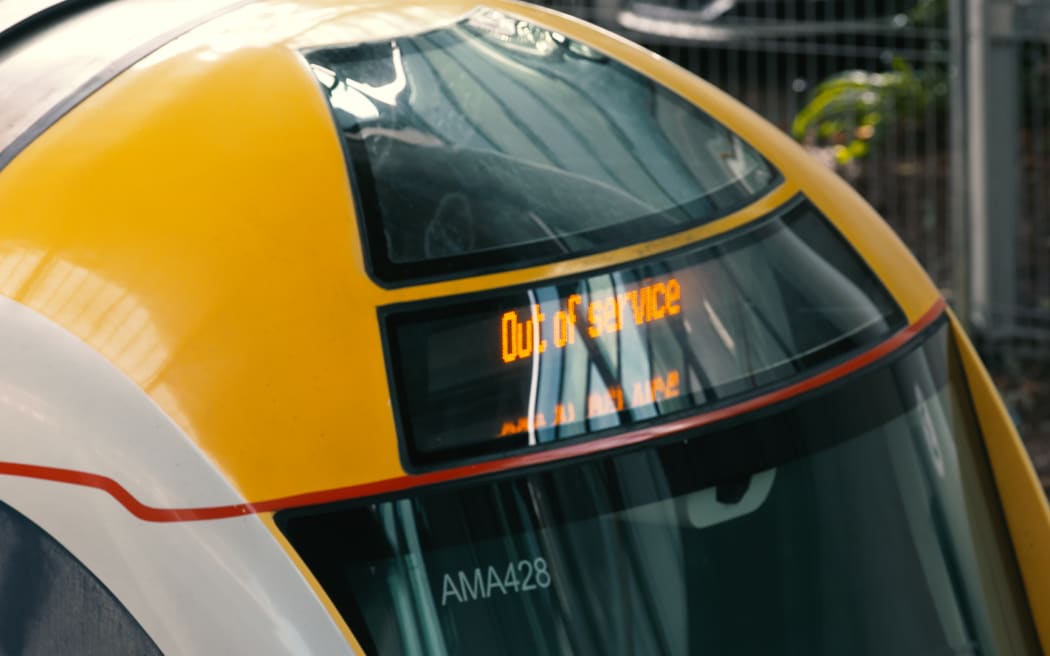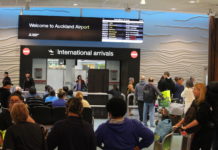By Maia Ingoe of RNZ.co.nz and is republished with permission
Starting today, Auckland’s railway lines will be empty with no trains operating for the next 32 days.
Photo: RNZ / Nick Monro
It is the first extended period of rail closures in the city – in total, 96 days of empty tracks are planned, through to the end of January 2026.
That means no passenger trains, freight trains, Northern Explorer or Te Huia train.
The shutdown is to allow for KiwiRail to complete rail rebuild works that are crucial to the successful opening of City Rail Link in 2026.
When will trains be down?
KiwiRail and Auckland Transport have tried to match up the rail shutdowns with school and public holiday periods.
These include:
- The summer holidays from 26 December to 27 January 2025
- Easter and term one holidays from 12 to 27 April
- King’s Birthday from 30 May to 2 June
- Matariki from 20 to 23 June
- Labour weekend from 24 to 27 October
- Summer holidays from 20 December to 26 January 2026
Another 24 days of trains running at single-line reduced frequency are also planned for 2025 – happening every second weekend from 28 June to 21 September, and for 12 consecutive days from 14 to 25 December.
A few weeks of back-up closures are also set out, but will only be used if needed – trains will run on a single line, at a reduced frequency. If KiwiRail needs more time to complete work, it has set out 29 total days, in three blocks over January/February, June/July, and September/October school holiday periods.
Photo: RNZ / Cole Eastham-Farrelly
Why does this have to happen?
The shutdown makes time to complete the final stages of the Rail Network Rebuild – a long-winded project of upgrading and repairing Auckland’s railway system, which commenced in January of 2023.
KiwiRail chief infrastructure officer Andre Lovatt said it was “critical upgrade work” to get the network ready for the City Rail Link.
“What we’re doing in that period of time is upgrading our network from a freight train network to one that can withstand or accommodate the very high frequency metro trains that are gonna be on the tracks when CRL opens.”
City Rail Link, when opened, will double Auckland’s rail capacity with four new stations in the CBD.
But to ensure the full CRL benefits of more reliable, faster and frequent trains are realised, rebuild work on the rest of the railway network needs to be finished.
Without the 96 days of closures, the rebuild would have been completed after CRL’s opening.
“If we weren’t able to do that, then all of that taxpayer money that’s been invested in CRL hasn’t actually resulted in the ultimate benefits of that project,” Lovatt said.
The government has also put $200 million towards getting the rail rebuild finished.
Photo: 123RF
What railway works will be done?
KiwiRail will be replacing track foundations and improving drainage on the Western Line between New Lynn and Swanson, and on the Southern Line between Newmarket and Britomart, and between Ōtāhuhu and Papakura, and on other parts of the network.
It will be replacing ageing sleepers on bridges around Newmarket, Parnell and near Tāmaki Drive, and working on the Parnell tunnel.
And upgrades to track infrastructure, power supplies and signal systems will – among other things – remove the temporary speed restrictions that caused havoc and widespread cancellations last February in Auckland.
Upgrades to Middlemore station will be finished, and new stations in Drury and Pareātā will finish construction.
Lovatt said KiwiRail was squeezing a decade’s worth of work into 15 months.
“We are going to be able to operate more frequent trains and trains will be able to run faster. In essence, what that will mean is in the city, trains will run every four to five minutes, and journey times – for example from Henderson in the west to the central city – will be a 35-minute journey.”
What other public transport options are there?
Auckland Transport group manager of public transport operations Rachel Cara said rail replacement buses will be put on whenever trains are not running, every 20 minutes, and other frequent routes will be bolstered with extra services.
From 6 January, AT will be adding express rail replacement buses as people return to work.
“We’re confident that the plan we have will be able to cope with the number of passengers that will be moving through this four-week period. It’s a quieter time of year for public transport with lots of people still on holiday. We’re also able to redeploy school buses to support our rail replacement services as well.”
Cara said the AT operations centre would be closely monitoring the network and traffic flow during the rail shutdown.
There was a dedicated plan for the first 32-day shutdown, and Cara said AT will come up with specific plans for the rest of the closures throughout 2025.










